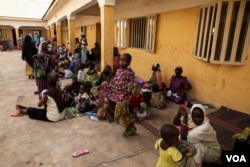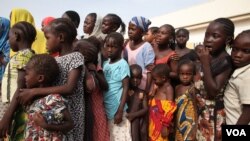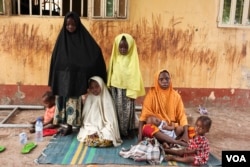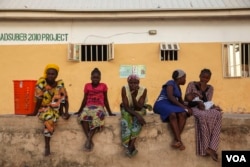After being kidnapped from their homes and forced deep into forest strongholds by the Nigerian extremist group Boko Haram, hundreds of rescued victims now call converted classrooms by the side of a red-dirt road home.
The 275 women, girls and children rescued by the Nigerian military from the Sambisa forest are free from Boko Haram, but not from the trauma they endured during their captivity.
On Wednesday, counselors began the hard work of helping the former captives take the first steps back to normal life after months of forced marriages, religious conversions at gunpoint, and a chaotic and bloody rescue by the military.
“From what they have lived, what they have gone through over the past years, obviously we are projecting that some of them manifest some kind of mental health problems,” said Chris Sabum, a psychosocial specialist with the United Nations Population Fund.
Last month, Nigeria’s military announced it would be assaulting the Sambisa forest as part of its campaign against Boko Haram. The extremist group has been on a six-year spree of sacking towns and villages, bombing markets, and carrying out mass kidnappings. By the start of this year, it had overrun territory about the size of Belgium in the country’s northeast, but was then routed in an offensive by the Nigerian military along with foreign mercenaries and troops from neighboring countries.
The Sambisa is one of the group’s last refuges. Since the military began its campaign in the forest last month, there have been several rescues of kidnapped women from the woodland.
Nearly 300 of those rescued are now in a converted school in Malkohi, a village on the outskirts of the Adamawa State capital Yola. They cram together on thin mattresses in what were once classrooms and rely on the government and aid agencies to hand out food.
The signs of Boko Haram’s brutal captivity are apparent all around. Many of the rescued children are lethargic, with the protruding bones and swollen stomachs that indicate malnutrition.
There are also few men. Many of the rescued women say Boko Haram fighters make a habit of killing the men and absconding with the women and children when they overrun towns.
Maryam Musa’s story is typical. She was kidnapped from the village of Gumsiri and held for three months in Gwoza, a town in Borno State that Boko Haram at one point declared part of its caliphate. But as the military started advancing on Gwoza, Boko Haram came and said the women had to relocate to the Sambisa forest.
They were marched deep into the forest, so deep that Boko Haram didn’t bother arming the three young men they sent to watch over them.
“The forest is big,” she said. “We don’t know where to come running to.”
She and a group of others — she can’t say how big — slept outside under a tree, taking orders from the boys on pain of caning if they disobeyed. The other Boko Haram members stayed in round huts, surrounded by young men who would guard them.
One day, she started hearing gunfire. The military was coming, the Boko Haram members said. They started tossing stones at the women to get them to move to another camp, called Markas, but her group stayed firm, and the Boko Haram members eventually fled.
About 15 captives went and hid in the bushes to avoid the fighting, but a military vehicle accidentally ran them over them, killing them.
Musa is now here in the camp with her son, who was born during her captivity in Gwoza. She hasn’t named him, as that’s up to the father, who ran away when Boko Haram was attacking Gumsiri, and hasn’t been seen since.
Survivors like Musa may be deeply traumatized by their experience, says Sabum, but often don’t know how to deal with it. They may think they’re going mad, he said.
“Even when they have these bad dreams, even when they are sad all the time, even when they cry all the time, they may not be aware they need mental help,” Sabum said.
Sabum said no one knows how long these girls will be at the camp. Some come from areas that were recently liberated from Boko Haram, others from places that are still dangerous. Boko Haram tends to burn and plunder the territory they occupy. Those that return home may find their houses nothing but ashes and rubble.









